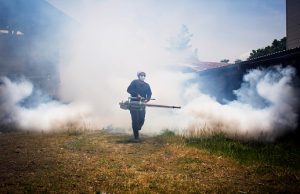 A week ago (July 17, 2015) Bel Marra Health reported about a drug currently being developed by researchers from UT Southwestern Medical Center and researchers in Australia, that shows promise as a cure for malaria.
A week ago (July 17, 2015) Bel Marra Health reported about a drug currently being developed by researchers from UT Southwestern Medical Center and researchers in Australia, that shows promise as a cure for malaria.
On the heels of that report comes a possible malaria vaccine.
Advertisement
The Committee for Medicinal Products for Human Use (CHMP), a division of the European Medicines Agency (EMA), worked closely with other experts from the World Health Organization (WHO) and regulatory authorities from relevant countries before adopting a positive scientific opinion for Mosquirix a vaccine for Plasmodium falciparum and hepatitis B vaccine.
The recently developed vaccine is intended for the active immunization of children aged six weeks to 17 months against malaria in areas where malaria is regularly found, and also for immunization against hepatitis B.
The malaria vaccine Mosquirix, was submitted to EMA under to assess its quality, safety andefficacy and its benefit-risk balance, for markets outside of the European Union. However, in its assessment, the CHMP applied the same rigorous standards used for vaccines to be marketed within the EU. In spite of decades of research into malaria vaccinations, Mosquirix is the first malaria vaccine to be assessed by a regulatory agency.
In a large clinical trial conducted in seven African countries (Burkina Faso, Gabon, Ghana, Kenya, Malawi, Mozambique and Tanzania) Mosquirix provided adequate protection against Plasmodium falciparum in children aged between six weeks and 17 months.
Based on the results of the trial, the CHMP concluded that despite its limited efficacy (efficacy decreases after 12 months), the benefits of Mosquirix outweigh the risks. The CHMP considered that vaccination would highly benefit children in high-transmission areas where mortality is very high.
The CHMP highlighted that the use of Mosquirix will be according to official recommendations defined by WHO and regulatory authorities in the non-EU countries where the vaccine would be used. It took into account the risk of Plasmodium falciparum malaria in different geographical areas and available malaria control interventions.
Advertisement
Because Mosquirix does not offer complete protection, and the protection it provides decreases in the long-term, it is important that established protective measures, for example insecticide-treated bed nets, continue to be used in addition to the vaccine.
The CHMP also took it upon itself to follow up with the manufacturing company to ensure that the safety and effectiveness of Mosquirix is continuously monitored.
